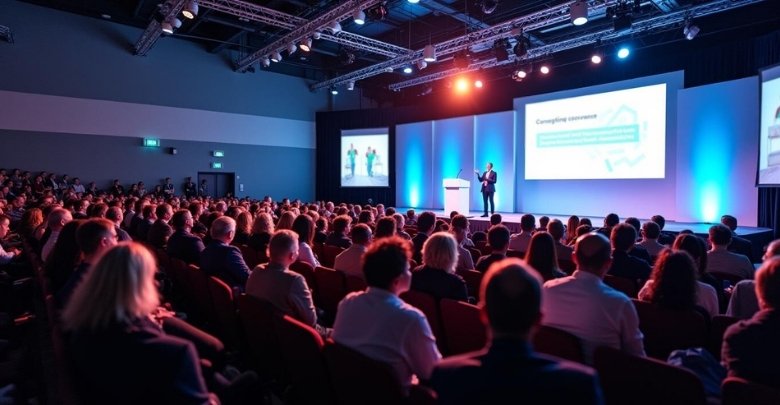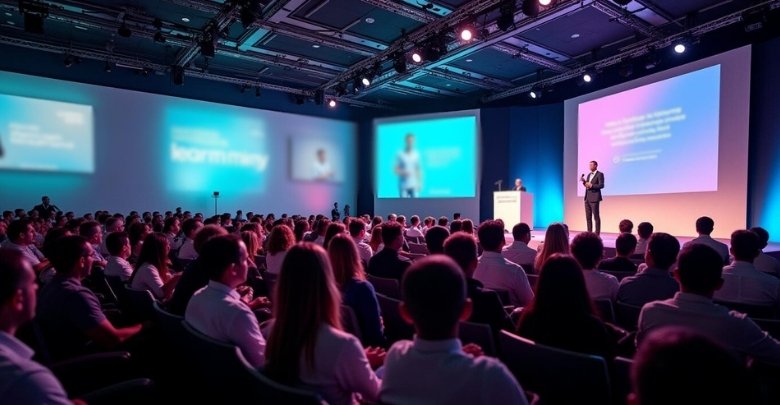There is no doubt that conferences are valuable opportunities for professional growth. They provide individuals with the opportunity to keep up to date on the latest trends, increase their skill set, and network with like-minded colleagues.
In particular, medical professionals benefit greatly from these events, since they provide a platform for learning from experts, sharing insights, and discussing advances in healthcare. But how often do medical professionals attend conferences?
The frequency of medical professionals attending conferences varies according to their specialty, career goals, and how relevant the conference topics are to their specific practice. Some may attend frequently to remain at the forefront of their field, while others may participate less often, based on their schedules and professional needs.
The purpose of this article is to give you a better idea of the factors influencing this attendance as well as the benefits it can provide for medical professionals. So stay with us.
How Often Do Medical Professionals Attend Conferences?
Medical professionals attend conferences regularly to stay updated with industry advancements, improve their knowledge, and network with peers. Attendance frequency can vary significantly depending on several factors. While some professionals may attend multiple events each year, others might participate less often based on their specific needs and the relevance of upcoming conferences. Here are the factors influencing attendance:
Specialty Relevance
Medical professionals tend to attend conferences that focus on their specific areas of expertise. Events featuring breakthroughs in their field attract more attention. Those specializing in niche areas may attend fewer but more targeted conferences. Relevant conferences help deepen knowledge and keep skills up-to-date.
Career Development Goals
Attending conferences is often linked to personal career goals and aspirations. Professionals focused on research may prioritize academic conferences for new findings. Others aiming for leadership roles attend events centered around management and healthcare policy. Career-driven participation helps individuals grow and progress in their fields.
Continuing Education Requirements
Medical professionals often need to meet continuing education requirements for licensure. Conferences provide an effective way to fulfill these requirements while learning. These events offer workshops, seminars, and certifications that count towards educational credits. Regular participation helps maintain necessary credentials and keeps professionals informed.
Budget and Financial Constraints
Cost is a significant consideration for many professionals. Expenses like registration fees, travel, and accommodation can be barriers. Financial support from employers or organizations can influence attendance. Some professionals might attend fewer events due to personal budget limitations.
Availability and Schedule
The availability of medical professionals also influences conference attendance. Busy schedules can make it difficult to attend frequent events. Conferences during off-peak times are more likely to attract attendees. Professionals prioritize conferences that fit into their demanding work schedules and personal commitments.
Event Location and Accessibility
The location of a conference plays a significant role in attendance. Those held in major cities or easily accessible areas tend to attract larger crowds. Conferences in remote locations may require more effort, but they can offer unique experiences. Professionals consider travel time and convenience when deciding on conference participation.
What Attracts Most to Medical Professionals to Attend Conferences?
Medical professionals find conferences invaluable for various reasons, from enhancing their knowledge base to networking with peers. These events provide an essential platform for them to engage with the latest in medical practice and technology. Here are a few reasons why medical professionals attend these events.
- Continuing Education: Conferences provide the latest medical education in a condensed format. This efficiency is highly valued by busy professionals.
- Networking Opportunities: Meeting peers and industry leaders can lead to collaborations and job opportunities. Such interactions are often as valuable as the sessions themselves.
- Access to Innovations: New medical technologies and methodologies are regularly showcased at these events. Professionals come to stay ahead of technological curves.
- Professional Recognition: Presenting research and receiving feedback from peers enhances professional stature. Many attend to enhance their reputation within the medical community.
- Skill Enhancement Workshops: Practical workshops offer hands-on experience with new techniques. These sessions are particularly attractive for skills development.
- Inspirational Talks: Keynote speakers can inspire and motivate, providing fresh perspectives on common challenges. Such talks are a major draw for attendees.
- CME Credits: Many conferences offer continuing medical education credits necessary for license renewal. This practical benefit drives attendance.
- Location and Venue: Sometimes, the appeal of a great location can increase attendance. A desirable venue makes the conference experience more enjoyable.
Which Conferences Are Most Popular Among Medical Professionals?
Medical professionals attend various conferences to stay updated on advancements, enhance their skills, and expand their professional networks. A variety of interests are served by these conferences, which provide specialized knowledge, innovative solutions, and collaboration opportunities. Here are some of the most popular conferences among medical professionals and why they are so valuable:
Medical Conferences
Medical conferences are the primary source of professional development for healthcare practitioners. These events cover topics such as research, treatments, and emerging technologies. Besides that, a few of the most popular topics in medical conferences include personalized medicine, robotics, and healthcare policies. During the conference, attendees receive actionable insights to improve patient care and remain competitive.
Business Conferences
Business conferences are vital for medical professionals in leadership roles or running private practices. These events teach financial management, marketing, and operational strategies. Participants learn how to improve practice efficiency and manage healthcare teams. Such knowledge enhances both business acumen and patient satisfaction.
Healthcare Conferences
Healthcare conferences focus on innovations in patient care, hospital management, and healthcare technology. Attendees explore advanced treatments and global health challenges. These events emphasize collaboration between healthcare providers and technology developers. They are ideal for professionals aiming to revolutionize healthcare delivery systems.
Humanities Conferences
Humanities conferences explore the ethical and cultural aspects of healthcare practices. Topics like medical ethics, patient communication, and cultural competency are commonly discussed. These events encourage a deeper understanding of patients’ diverse backgrounds and perspectives. Professionals attend to develop compassionate and culturally sensitive healthcare practices.
International Education Conferences
International education conferences emphasize the global exchange of knowledge in medical education and training. These events discuss curriculum development, teaching methods, and student engagement. Attendees share innovative practices to improve medical education standards globally. They are especially useful for educators and academic leaders.
Environmental Conferences
Environmental conferences focus on the intersection of healthcare and environmental sustainability. Topics include climate change’s impact on health and eco-friendly healthcare practices. Professionals learn strategies to reduce the environmental footprint of healthcare facilities. These events promote sustainable practices in the medical industry.
Is Medical Conference the Most Impactful for Medical Professionals?
Yes, medical conferences are among the most impactful events for medical professionals. They provide essential learning opportunities, focusing on the latest advancements and practices. These gatherings create a space for sharing knowledge that directly improves patient care and healthcare delivery.
Medical conferences also encourage professional growth by providing opportunities for collaboration and networking. Here attendees connect with experts, peers, and industry leaders, building valuable relationships. Such connections often lead to innovative ideas and long-term collaborations that benefit the medical community.
When professionals attend international medical conference, they gain exposure to global advancements and diverse perspectives. This broadens their understanding of global healthcare challenges and solutions. The combined benefits of education, networking, and exposure to the global market make medical conferences essential for professional development.
Regional vs. International Conferences: What Is Preferable to Medical Professionals?
Medical professionals often choose between regional and international conferences based on their goals, budget, and accessibility. Both types offer unique benefits, from local networking to global exposure. This table compares the key aspects of regional and international conferences to help professionals decide what suits them best:
| Aspect | Regional Conferences | International Conferences |
| Cost | Lower registration, travel, and accommodation expenses. | Higher costs due to international travel and premium venues. |
| Accessibility | Easily accessible within a short travel distance. | Requires visas, long-haul flights, and more planning. |
| Networking | Focused on building local professional relationships. | Expand global connections with professionals worldwide. |
| Content Relevance | Topics relevant to regional healthcare needs and trends. | Covers global trends and advancements in the medical field. |
| Exposure to Innovations | Limited to region-specific practices and technologies. | Broader access to advanced global research and innovations. |
| Cultural Diversity | Lesser cultural diversity among attendees and speakers. | High cultural diversity, encourages varied perspectives and learning. |
| Frequency | Organized more frequently and locally accessible. | Less frequent but often larger in scale and impact. |
| Professional Recognition | Builds reputation within a regional community. | Enhances visibility and recognition on a global platform. |
Top Tips for Medical Professionals on Joining Conferences Without a Hassle
Medical professionals can benefit from attending conferences, but they should prepare in advance to avoid hassles. From registration to networking, proper preparation is key. The tips below will help you make the most of your conference experience:
- Plan Early: Register well in advance to secure your spot and avoid last-minute issues. Early planning helps you manage time and budget efficiently.
- Research the Agenda: Review the conference schedule and topics to ensure they align with your goals. Focus on sessions relevant to your specialty or interests.
- Book Travel and Accommodation: Reserve your travel and stay close to the venue for convenience. Early bookings save money and reduce logistical stress.
- Prepare Required Documents: Ensure your registration confirmation, ID, and other necessary documents are ready. Organized paperwork avoids delays during check-in and participation.
- Set Clear Goals: Identify specific objectives, like networking or learning new skills. Clear goals help you make the most of the conference experience.
- Engage Actively: Participate in discussions, ask questions, and join workshops. Active involvement enhances your learning and leaves a positive impression.
- Network Effectively: Bring business cards and connect with peers during breaks. Networking fosters long-term professional relationships and opens collaborative opportunities.
- Follow-Up Post-Event: Reach out to new contacts and implement insights gained during the event. Post-conference actions maximize the value of your participation.
FAQs About How Often Do Medical Professionals Attend Conferences
Conferences are often attended by medical professionals to stay up-to-date, network, and develop their skills. This FAQ section addresses common queries about the frequency and factors influencing their participation. Explore below to gain deeper insights into their conference attendance practices.
What Are the Benefits of Presenting at Conferences?
Presenting research at conferences enhances professional recognition and confidence. It provides a platform to share expertise with peers. Presenters often receive valuable feedback that refines their work and enhances their professional credibility.
What Is the Role of Mentorship in Conference Attendance?
Mentors often guide professionals in choosing beneficial conferences. They share insights about valuable sessions and networking strategies. Mentorship helps attendees make the most of their conference experiences.
How Does Conference Attendance Enhance Patient Care?
Learning new treatments and technologies at conferences directly impacts patient outcomes. Professionals apply these insights to improve diagnosis, treatment, and care quality. Continuous education through conferences ensures up-to-date practices in healthcare.
What Types of Workshops Are Most Beneficial?
Hands-on workshops focusing on new technologies and techniques are highly beneficial. These sessions provide practical skills applicable in real-world settings. Professionals value workshops that enhance their proficiency and improve clinical outcomes.
How Do Medical Professionals Stay Engaged During Conferences?
Active participation in discussions, workshops, and Q&A sessions keeps attendees engaged. Setting personal goals for learning and networking enhances focus. Engaged professionals often gain more value and retain knowledge effectively.
Final Thoughts
A medical professional’s growth and development depend on attending conferences. To better understand the frequency of participation, consider this question: How often do medical professionals attend conferences? The frequency varies depending on their specialty, career goals, and the relevance of the event topics.
These conferences provide key opportunities to stay updated on industry advancements, expand knowledge, and network with peers. Whether it’s for continuing education, career progression, or exposure to innovations, conferences play a significant role in the healthcare field.
These valuable learning experiences can be made more effective when medical professionals carefully consider factors like budget, time, and relevance, ensuring their continued success.








